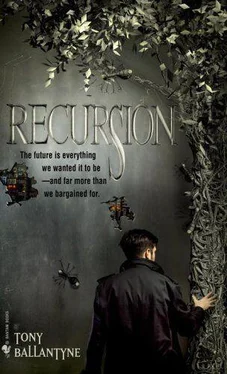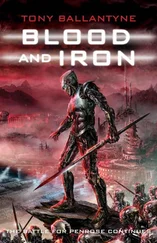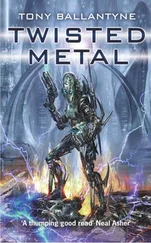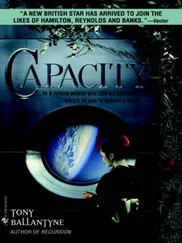“What now?”
“Go down the steps,” said Marion. “Someone will be waiting for you at the bottom.”
“Aren’t you coming, too?”
“No. I’ll wait here for your return.” She shivered, and said with real feeling. “I couldn’t bear to wait out there.”
Constantine shivered in sympathy. “I know what you mean.” He turned and began to descend.
Constantine danced quickly down the stairs, the stone treads beneath his feet sending up a pitter-patter echo in the narrow passageway. As he reached a landing, the stairway reversed direction, yet still heading down. The feeling that he had been here before was rising in Constantine all the time. Onto another landing and he reversed direction again. There was a door at the bottom of this next flight of steps. A green double door with anti-crush bars stretched across, faintly patterned with the oil of a thousand fingerprints. And Constantine at last remembered where he was. He pushed open the doors of the concert hall and stepped out onto the wide paved area of the fourth level of Stonebreak.
A familiar figure in a shabby green suit was waiting for him, just beyond the doors.
“Hello, Mary,” said Constantine.
Mary led him to a nearly empty cafe bar located close to the Source. They ordered tiny cups of espresso and tall glasses of chilled water and carried them to a table well away from the bored-looking youth who served at the counter. Around them, the tables were still littered with dirty cups, dried coffee foam forming tidemarks around the rims; half-eaten sandwiches, and cakes dried and curled on plates. Mary looked across to the five entwined branches of the Source and then raised her espresso cup to Constantine.
“Cheers,” she said.
“Cheers.”
Mary sipped at the strong coffee then took a drink of cold water. Constantine did the same. The contrast between the strong, hot, bitter coffee and the refreshing coldness of the water was stimulating. Constantine replaced his cup on the saucer and sat up straight.
“What’s it all about, Mary?”
She sat up a little straighter too and looked at him.
“I was supposed to be your conscience. It was another possible way to get what we wanted from you.”
Constantine said nothing for a moment, took another sip of espresso, another of water.
“It probably stood the best chance of working, you know.”
“The company AI said it would. I never believed it.”
“Which company is it?”
“The company now called 113 Berliner Sibelius, following the corporate merger at the AI level earlier this week. My presence is also partly explained by the much more environmentally aware policy we’ve been pursuing since then. I’m not sure it’s to our benefit, you know, but there you go. Who are we to argue with an AI?”
“Who indeed?” asked Constantine. He looked across to the Source again.
“Is the DIANA strand crumbling out in the real world, too?”
“Oh, yes,” said Mary.
He finished off the espresso and downed the rest of the water in one gulp. He was ready for a whisky, now.
“So. What is it you want to know?” he asked.
Mary smiled at him and sat back in her seat. A young couple crossed the square behind her, wrapped up in each other’s arms.
“Three things,” said Mary.
She raised a finger. “One, how did you carry the VNM away from Mars?”
She raised a second finger. “Two, where did you take the VNM? How are you maintaining its integrity?”
A third finger. “And three, what are you going to do with it?”
“Can’t you guess?” asked Constantine.
“Oh, we can see the point, sort of. We know that the VNM is entirely the product of human ingenuity. As a human-” she smiled briefly “-as the personality construct of a human, I share your concerns about the motivations of AIs and realize the value of having something untouched by their machinations. We just don’t see the commercial advantage.”
“Maybe there isn’t one.”
Mary said nothing. Constantine held her gaze for a moment.
“Okay. I’ll answer your first question. I didn’t take the VNM off the planet. I couldn’t. You’re thinking of modern self-replicating machines, the sort of thing you can hold in your hand or pour by the million into a bottle. This was a first attempt: thirty gigabytes of code and about one hundred tons of raw materials. It was the code that counted. That’s what I took away.”
“Couldn’t you just get it from records here on Earth?”
“How do we know it hadn’t been subtly altered by the AIs in the meantime? How paranoid can we be here? Every processor, every memory slice that can be accessed by an AI is necessarily suspect. I couldn’t even trust a modern secured memory slice; it would have to interface with modern equipment eventually and then that code would become visible. So I took something called a laptop computer. Over a hundred years old-an oversized plastic box with a fixed-size viewing field and a data entry area that hurts your back and arms and neck just using it.”
Constantine rubbed his hands unconsciously as he remembered the odd machine: crouching at the overlarge device, the strange feel of the antique plastic keys moving beneath his fingers as he painfully typed out instructions, the eerie glow of the viewing area on his face; the humming noise and the bizarre way that it blew warm air out of a vent in its side as it worked; the fact it needed a power source-what modern thinking machine needed power?
“It was a museum piece, Mary,” he said. “Priceless. They can’t make them anymore. You’d have to build a factory just to construct the processor. Too much effort. There’re only about ten of them left working now. When they all die, that will be it. The programs that ran on them will live on in emulators, but the original machines that made those programs live will be just so much metal and plastic. It’s…not sad exactly. I don’t know…The passing of something?”
He tilted his head to one side. “You know, that’s just like us, isn’t it? Minds without bodies. I never thought of that before.” There was another pause.
He sighed. “You know, this is nice in a way. Two years alone. It’s nice to speak to someone about things. What I’ve done. What I’ve seen. Have you ever been to Mars, Mary?”
She shook her head.
“It’s an odd place. A vision of what might have been. The future maybe, but not our future. A Buck Rogers future…” His voice trailed away as he remembered the events of a year ago. Flying up to the Martian factory mine. Its odd pyramidal shape seemed appropriate somehow on the red plain of the Martian desert. The soft voices of the flier’s pilot and of Louisiana Station control were the only sounds in the cabin as they approached the red-and-silver mass of the construction. They had skimmed over the tracks of two robot crawlers, low cylinders suspended from huge balloon tires that were trundling in a straight line from the base, headed who could know where. The mine drew closer. A jumble of steel and iron and rock. A miniature city built by and for machines.
Constantine jerked himself back to the present. “The AIs haven’t touched the place. It’s a preserved land, but what they’ve preserved there is our human past. The original project has been left to run unhindered. Everything there is a product of human ingenuity. It’s…” He shook his head.
“The…silence there, the intent…I can’t describe it. We developed Antarctica, we let AIs loose on the moon…I don’t know.”
Mary said nothing. The young man who had been serving behind the bar had finally left his place and was clearing used cups and litter onto a tray.
“I landed there and entered through a maintenance hatch. Can you imagine, those earthbound engineers, over a hundred years ago, designing a city that was to grow on another world? A city that only existed to them as lines of code, designed to be built in a place they could never visit. And while they wrote that program, they thought to include doors for future humans to enter the site, and access corridors and interface slots where they could plug in their laptops.”
Читать дальше












